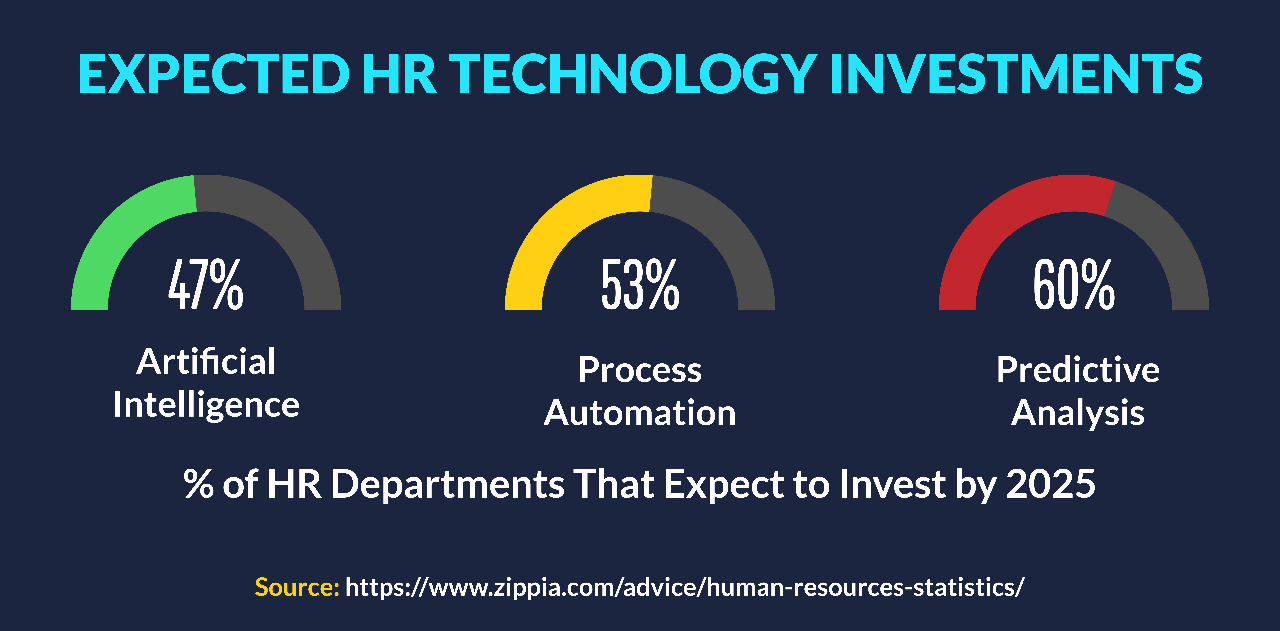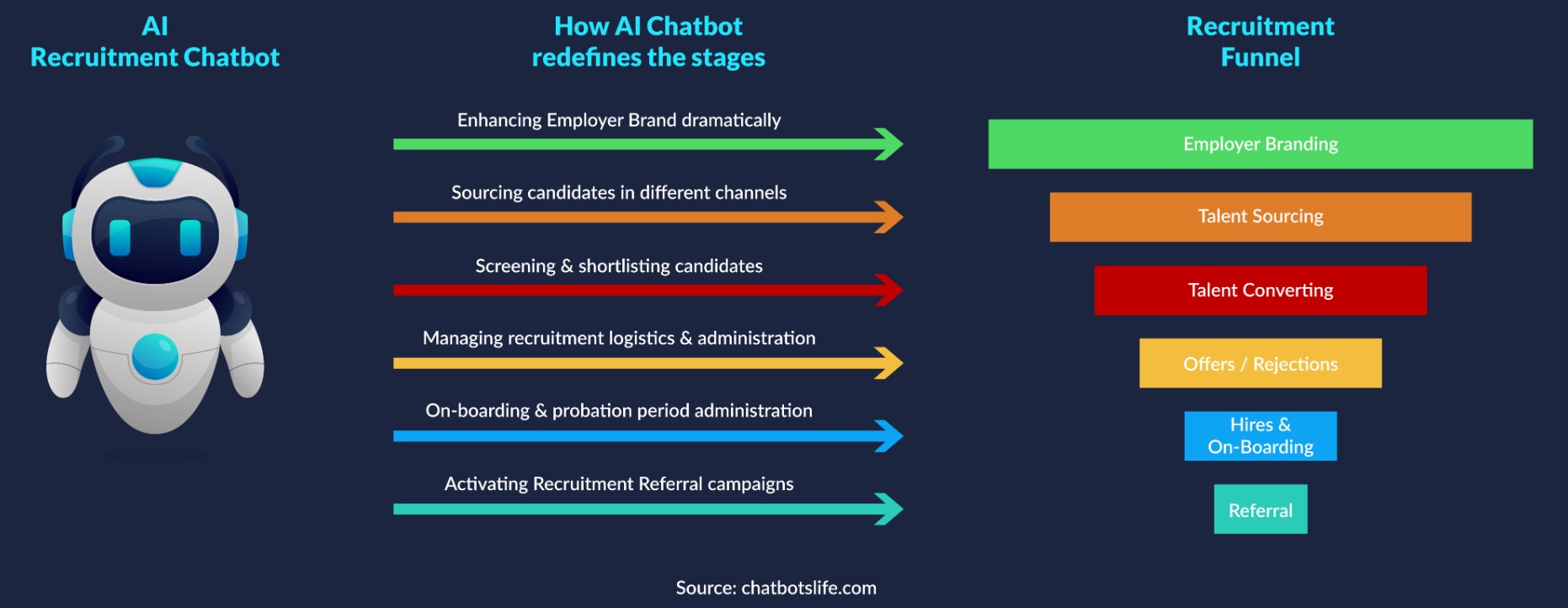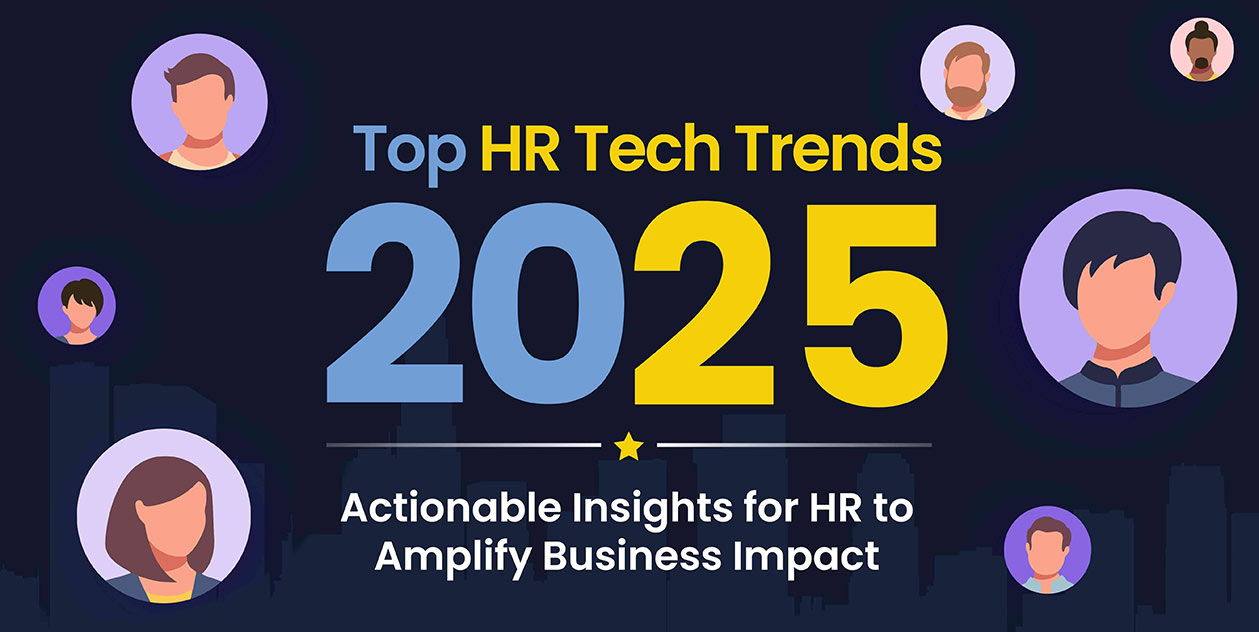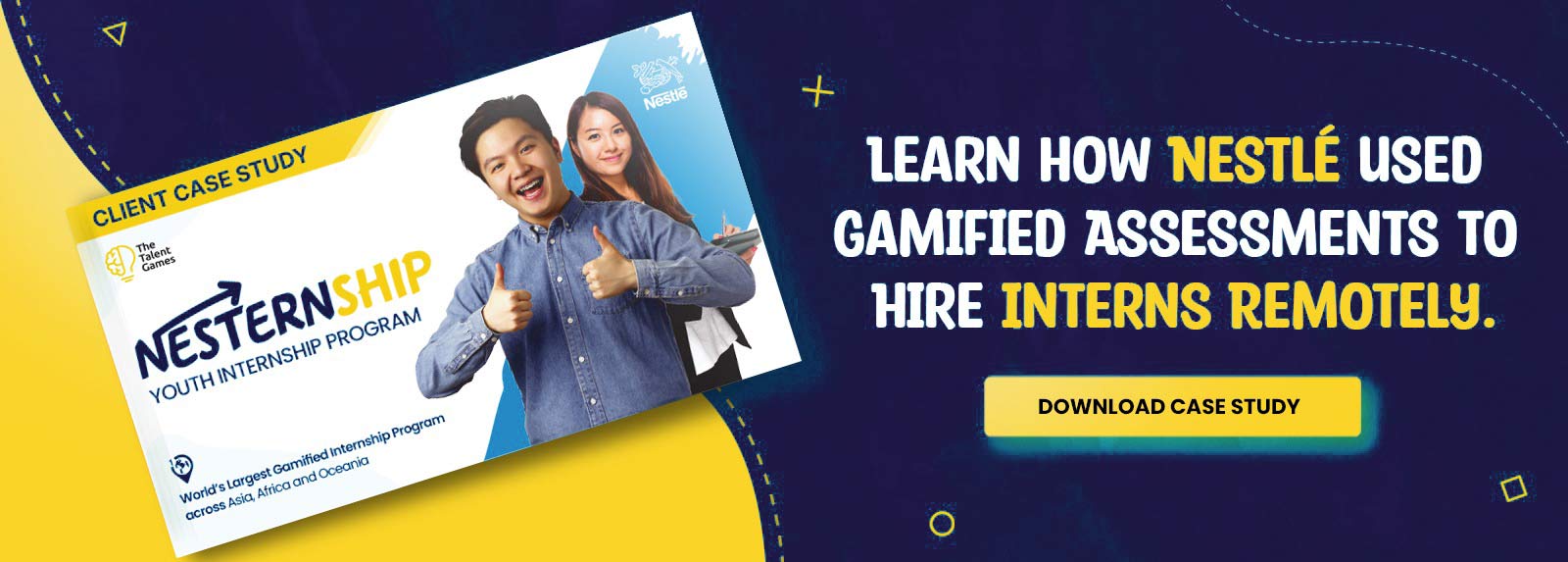The HR landscape has been evolving with the introduction of new technologies from AI to Gamification in recruitment. In this blog, we uncover the key HR Tech trends in 2025 poised to take your recruitment strategies to new heights.
HR Tech Trends 2025: Technologies like Generative AI have dominated every industry including Recruitment in 2024. As we move on to 2025, the spotlight remains on sustaining momentum and despite economic uncertainties, 89% of HR leaders plan to boost their tech budgets making it the top investment area.
Let’s look at the top trends that are going to make an impact in the market for HR leaders to develop effective HR strategies and employee experience. Remember, it’s crucial to put these ideas into practice by focusing on your people, and prioritizing what your workforce needs and aspires to achieve.

Top 10 HR Tech Trends 2025
- AI Integration in Recruitment
- Gamification in Recruitment
- Use of Chatbots
- Blockchain for Talent Acquisition
- The Rise of Psychometric Assessments
- Work Flexibility
- Welcoming Boomerang Employees
- Smart Work Force Planning
- Embracing Cloud-Based Systems
- Promoting an Inclusive and diverse work culture
- Bringing Employee Experience to the Spotlight
TREND #1: AI Integration in Recruitment
Last year, AI integration in recruitment emerged as a powerhouse trend, revolutionizing the hiring landscape. The trend not only streamlined the entire recruitment process but also brought unprecedented efficiency to candidate sourcing, screening, and selection.
As we step into 2025, AI’s influence like ChatGPT in recruitment continues to dominate, promising further advancements in optimizing talent acquisition. This trend not only simplifies administrative tasks but also allows HR professionals to focus on the more strategic and human-centric aspects of the hiring journey.
TREND#2: Gamification in Recruitment
Gamification in recruitment refers to the practice of incorporating game elements and mechanics into the recruitment process to engage candidates, assess their skills, and solve one of the top challenges of Large-Volume Hiring which is to enhance the overall candidate experience.
Gamified assessments aim to make the recruitment process more interactive, enjoyable, and immersive for candidates while providing valuable insights to recruiters. It is becoming one of the most effective HR Tech trends because it does not only help in recruiting talent without any biases involved but also, it boosts employer branding as well.
Gamification in recruitment is not completely a new trend but that is an innovation that is extensively increasing for employee engagement and assessment.
It provides leaderboards, rewards, and badges (whether virtual or physical) that can be used to enhance the training of the employees and encourage completion.
TREND#3: Use of Chatbots
The numerous HR tasks from recruiting, and onboarding new talent to tracking the performance of the employees can turn out to be repetitive and exhausting. For instance, HR teams have to spend most of their time responding to the same questions. Chatbots which are conversational AI will help organizations automate dull HR tasks for instance:
- Scheduling interviews
- Responding to the candidates’ questions
- Answering employee FAQs
- Managing leave requests by processing them in absence management
The chart below explains various other ways in which Chatbot can be helpful for your organizational needs, especially for recruitment purposes. These chatbots will reduce the load on HR teams and they can focus on essential tasks that require human interaction and judgment.

TREND#4: Blockchain for Talent Acquisition
Blockchain integration has become a hot topic in the recruitment world due to the ease it offers in recruitment and talent acquisition. It is expected to change the complete operation of Human Resources from mitigating risks traditionally linked with limited trust, instant screening, and providing credential verification to the execution of direct cross-border payments.
Blockchain has been used most commonly in Supply Chain and Finance but according to a study conducted by IBM, the blockchain value is expected to have a major impact on HR (Human Resources). Blockchain, along with AI and other automation, could provide companies with the ability to perform an audit, manage data, and perform several administrative tasks.
Trend#5: Rise of Psychometric Assessments
Accompanying the AI wave is the surge in the adoption of psychometric assessments. Recognized as recruiters’ top choice, psychometric assessments have proven to be invaluable tools in evaluating candidates’ cognitive abilities, personalities, and potential cultural fit within organizations.
We’ve seen top companies like Nestle, Shell, Bupa, and various others relying on psychometric assessments for hiring candidates. This has become one of the vital HR Tech trends signifying a strategic shift towards more holistic and data-driven approaches in the hiring process.
TREND#6: Work Flexibility
Organizations are embracing a shift from office-centric practices to a human-centric model in order to control the employee turnover ratio. The employee-driven approach from companies empowers employees to choose how, where, and when they work. According to research by Gartner, 52% of employees claim that flexible working policies play a crucial role in deciding to stay with the organization. In order to be successful in the execution of this shift to flexibility, employers must ensure that flexible working is the default and not the exception and it is surrounded by principles, not policies.
TREND#7: Welcoming Boomerang Employees
The employees considered it wise to switch to new workplaces or switch careers because the global economy was booming. However, the global economy began shrinking and during this uncertain economy, many retirees are returning to their previous employers, as also those professionals who thought the grass was greener on the other end.
This situation is actually a bonus for many companies as they appreciate the return of their former employees (boomerang employees) because they have proven skill sets and institutional knowledge.
The organizations in 2025 will continue to maintain their professional relationship with leaving employees and ensure that their doors are open for them. Moreover, the companies can invest in their digital workforce performance technology to let talent acquisition teams keep track of their ex-employees to identify which one of them has the required experience and skills to acquire high-demand positions.
TREND#8: Smart Workforce Planning
In a complex economy, there is no guarantee that your workforce strategy will be as effective in the coming year as it was in the previous one. Talent managers will need to be more strategic in their future planning for a better understanding of their needs. To do this, they must disintegrate gaps and work with business leaders across all activities.
In the coming years, AI is going to be more helpful in predicting and determining the appropriate roles, skills, and geographies for the changing business. Employers’ hiring procedures are slowing down hiring as per recruiting trends. Additionally, if the industry does undergo a recession in 2025, businesses will need to re-invent their workforce planning and do new hiring much more cautiously.
To be able to deal with every kind of risk in the economic environment, talent acquisition professionals must carry out scenario-based workforce strategy plans and do a proper risk assessment. Within every case, they should be able to consider both the company’s crisis and quick recovery.
TREND#9: Embracing Cloud-Based Systems
The cloud-based systems are necessary to keep the employees connected and they don’t keep connected only the employees in the office but also the ones who are working remotely. Organizations are implementing these systems to keep up with technological advancements. Human Capital Management solutions or HCMs – powered by cloud technology are going to be essential tools for HR who can access real-time data of the employees to from any place at any time and make effective decisions.
TREND#10: Using Technology for Inclusive and Diverse Work Culture
The organizations are once again emphasizing on creating an inclusive and diverse workplace culture in 2025. There are companies that have already embraced the diversity and inclusion concept whereas, there are others that are still struggling to embrace it.
According to the Director of Inclusion & Diversity at Deloitte, companies with inclusive culture are “twice as likely to meet or exceed financial targets and far exceed their business outcomes” as compared to companies without inclusive culture. There is a growing number of modern workplaces that have started using D&I (Diverse and Inclusive) technologies for talent acquisition along with sourcing and selection.
TREND#11: Bringing Employee Experience to Spotlight
Organizations are spending money more than ever before for improving employee experience from onboarding to employing cloud solutions for effective communication. With the exponential development in technology, managers in HR now have the relevant tools to offer a seamless experience to candidates by employing solutions such as gamification, psychometrics, and other engaging solutions. Companies have realized that giving prior attention to the employee experience is the key to success.
Conclusion
Staying abreast of HR Tech trends remains essential as we navigate the dynamic landscape of Human Resources. In a future steered by continuous innovation and automation, adopting cutting-edge HR technologies is paramount.
Integrating these advancements into HR practices not only ensures efficiency but also lays the foundation for a workplace geared toward the future. We trust that the insights into the HR tech trends of 2025 have provided valuable perspectives for building a forward-looking and adaptive workplace.
FAQs
1. Are game-based assessments suitable for all job levels?
Industries like banking, consulting, retail, and tech are leading the adoption of gamified assessments. They help assess competencies like leadership, analytical thinking, and emotional intelligence. Even healthcare and government sectors are exploring gamification for hiring.
Do gamified assessments eliminate hiring bias?
While no method is 100% bias-free, gamified assessments reduce biases by focusing on performance rather than resumes or backgrounds. AI-driven scoring ensures fair evaluation based on skills and behaviors. This leads to more diverse and inclusive hiring.
What are the best gamified assessment platforms in 2025
Leading gamified assessment platforms include The Talent Games, Pymetrics, and HireVue. These platforms use AI and behavioral science to evaluate candidates’ skills in an engaging way. They help companies assess problem-solving, teamwork, and decision-making abilities.
How does HR technology improve candidate experience in 2025
HR tech enhances candidate experience through AI chatbots, personalized job recommendations, and gamified hiring processes. Automation reduces hiring delays, while interactive assessments keep candidates engaged. A smooth, tech-driven hiring process improves employer branding.
Who are the top HR tech leaders to follow in 2025
Some of the most influential HR tech leaders include Josh Bersin (HR Tech & AI Expert), Paul Keijzer (CEO, The Talent Games), Jeanne Meister (Future Workplace), and Lars Schmidt (Modern HR & Tech Innovator). These thought leaders share insights on AI in HR, gamification, and digital transformation in recruitment

